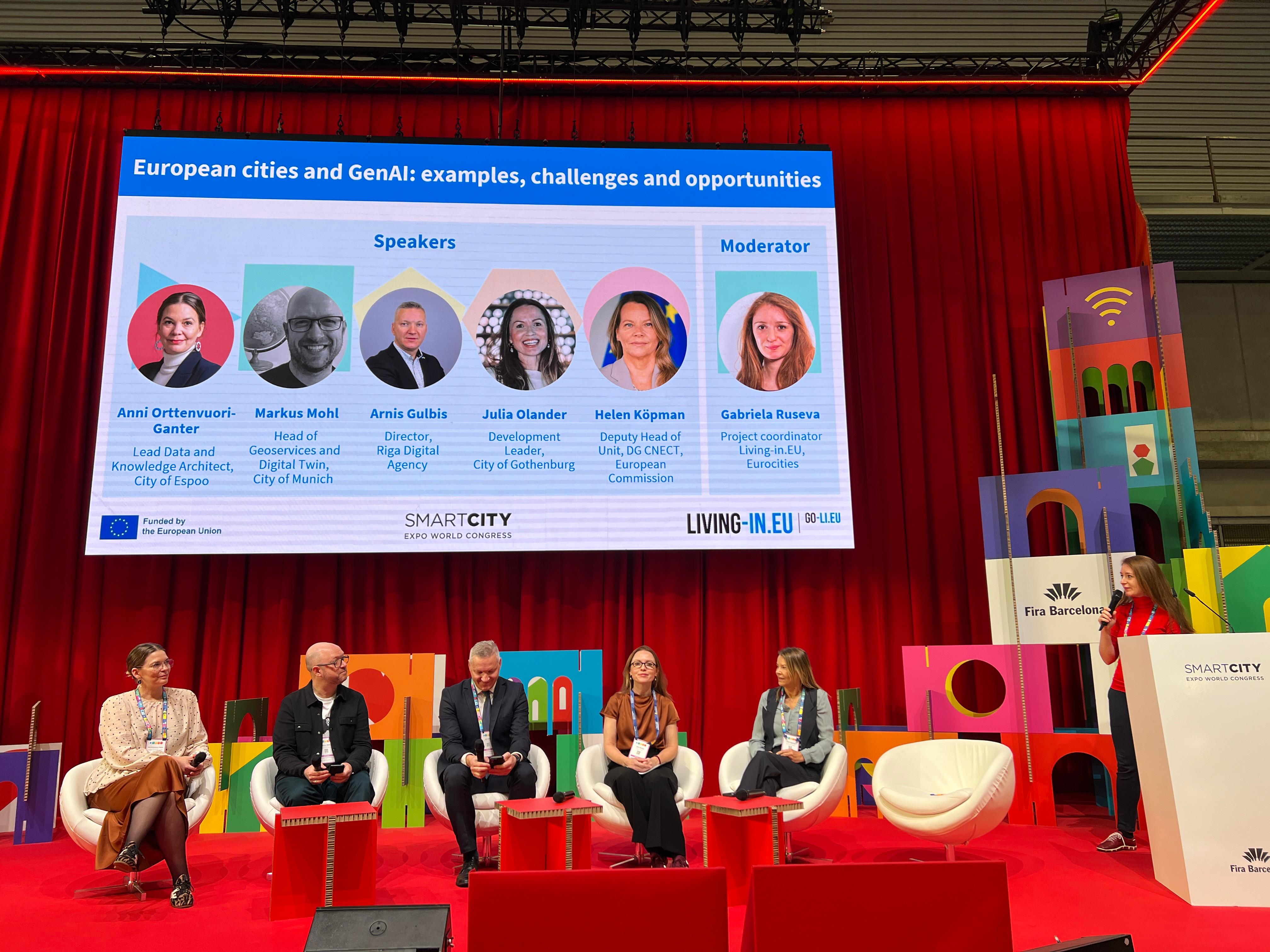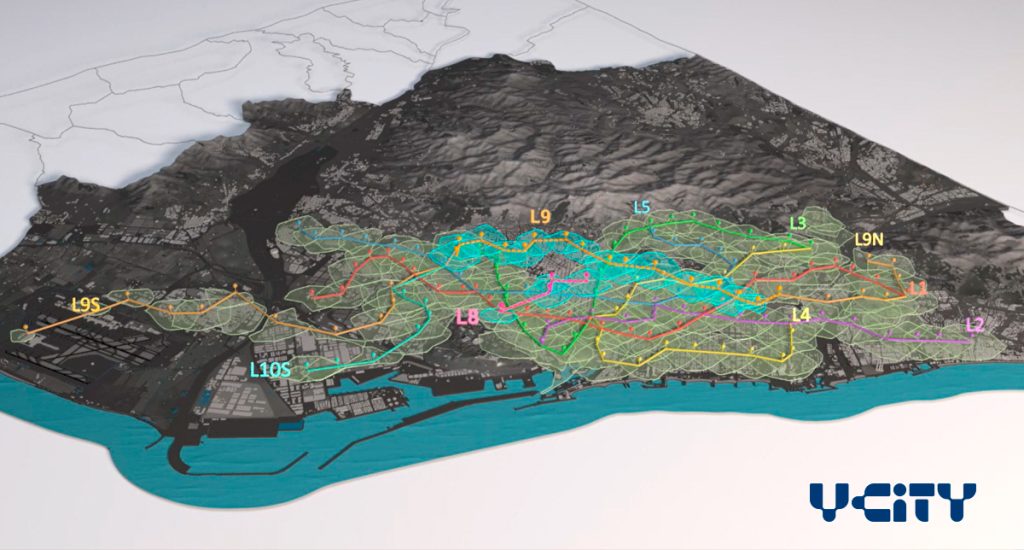Cities lead the way in building Europe’s AI future
Artificial intelligence is transforming how people live, work and interact, and European cities are proving that it can serve the public good as much as private sector innovation. While most of the attention has focused on the tech industry, local governments are quietly turning generative AI into a practical tool for better services, faster responses and more inclusive communities.
From hype to public value
“Most of the attention on AI goes to the private sector, but let’s not forget about the potential in the public sector,“ says Julia Olander, Development Leader at the City of Gothenburg. "It is in cities where AI can truly make a difference in the everyday lives of millions of residents.”
That difference is already visible. In Gothenburg, early pilots in home care, schools and libraries are showing how generative AI can remove barriers between people and information. “Now I get the answers in seconds, even while standing by the patient’s door,” says a home-care worker involved in the pilot. A preschool teacher adds: “Parents get answers to their questions instantly, which means I can spend more time with the children.”
For Olander, these examples capture what matters most: “GenAI is about making communication smoother, trust stronger, and life easier.”
Why cities matter in Europe’s AI journey
Cities are where policies meet reality. They hold vast amounts of operational data and deliver most public services, from transport to education to social care. That makes them natural laboratories for testing AI responsibly.
But cities also face unique constraints: limited budgets, strict privacy obligations and multilingual environments that few commercial AI models handle well.
Cities emphasise three shared challenges: trust, data governance and skills. As Anni Orttenvuori-Ganter, Lead Data and Knowledge Architect at City of Espoo, puts it: “Through the pilots, we learned that AI can deliver significant benefits, but its use must be continuously assessed and evaluated.”
Espoo: governing data, building capacity
Espoo’s digitalisation strategy places people and governance at its core. Its AI journey, Orttenvuori-Ganter explains, is guided by clear objectives: improving accessibility, enhancing decision-making and ensuring security.
One of Espoo’s flagship tools is AI-powered translation, which automatically renders city services into 13 languages. “AI in translation ensures everyone can access city services in their own language,” she says. “Espoo wants to improve services, accessibility, and support decision-making. And AI can support this.”
The city’s AI Workgroup monitors developments, issues internal guidelines, and runs clinics on data management, cybersecurity and generative AI tools, such as Microsoft Copilot. Each pilot lasts around 12 weeks and follows a structured process, from risk assessment and licence validation to data scanning and staff training.
“We need to be clear about our processes,” Orttenvuori-Ganter notes. “Who is supporting the user experience? How can I use my AI tools to improve my own working processes?”
Continuous learning, she adds, is essential: “We need to provide training resources, webinars and consultations; we need centralised teams to support our staff to upgrade our AI capabilities.”
Munich: when a city can talk back
In Munich, AI is giving new life to the city’s digital twin. Markus Mohl, Head of Geoservices and Digital Twin, describes their experiment as “GeoAI for citizens.” It is a conversational assistant that lets users talk to the city’s geodata portal as if it were a person. “We use our geoportal to portray information for stakeholders,” he says. “How can we make it more accessible? What if you could talk to it?”
The prototype, developed with the Technical University of Munich under the EU-funded ASCEND project, first used ChatGPT to test feasibility. “Despite the promising results, we identified uncertainty, hallucination and cost,” Mohl explains. The team then switched to open-source models such as Mistral, Gemma3 and Qwen2.5, which performed “very close, sometimes even better, than commercial LLMs.”
The next step is scaling up these solutions “by design” through European cooperation. “We had a proof of concept last year,” says Mohl. “Now, in the context of EU-funded projects, we can create more sustainable solutions.”
Riga: from decentralised chaos to shared vision
The Riga Digital Agency, led by Arnis Gulbis, is taking a pragmatic, incremental approach. “AI is the future, and we should jump on this train,” he says. Riga began by identifying where AI could save time in daily operations and gradually moved “from a decentralised chaos to a centralised research approach.”
The city has established an internal working group and now operates on three levels: using AI assistants like Copilot, developing tailored AI functions, and integrating AI capabilities directly into municipal systems. The practical applications range from security and mobility to daily operational tasks and the creation of individual AI agents to assist staff.
For Gulbis, efficiency is only part of the story. Collaboration with the wider ecosystem (universities, national authorities, and EU initiatives such as Living-in.EU and CitiVerse) is crucial. Yet he also points out one persistent obstacle: “One of the biggest challenges is language support, because large models don’t support Latvian.”
The European vision: an “AI continent”
At European level, the European Commission’s Apply AI strategy aims to make Europe “an AI continent.” As Helen Köpman, Deputy Head of Unit at DG CONNECT, European Commission, explainS, the goal is to link “computing infrastructure, skills, data, regulation and adoption” into one ecosystem that connects research with real-world deployment.
Europe is investing over €690 million to support the uptake of generative AI across strategic sectors, including the public sector, and setting up AI Factories, Gigafactories, Testing and Experimentation Facilities, and European Digital Innovation Hubs. These will give cities and administrations access to high-performance computing, shared data and training.
Köpman sums up the challenge: “Uptake of AI is still very low in industrial sectors, and even lower in the public sector. We want to make Europe a place where we can develop our own AI services.”
Shared challenges: trust, skills and inclusion
Each city faces its own context, but the barriers sound familiar: insufficient expertise, fragmented data, and the high cost of experimentation.
Olander acknowledges the human side of the equation: “The main challenge is enthusiasm for testing AI, but our capacity is limited. We have few specialists, and the quality of our data is not always ideal. Much of the knowledge we use is not in datasets. I used to say data is the gold, but it’s more like silver.”
Building trust is therefore paramount. “Citizens must be able to trust their information is safe,” she stresses, a sentiment echoed by all city representatives.
Living-in.EU: collaboration as the catalyst
Behind these experiments stands a growing European movement. Living-in.EU, coordinated by Eurocities, connects cities, regions and EU institutions to share digital governance principles, interoperability tools and AI experiences.
Project coordinator Gabriela Ruseva highlighs that Living-in.EU serves as a space “where cities learn from one another, align with EU frameworks such as the AI Act, and link their pilots to broader European initiatives.”
By pooling knowledge, cities avoid reinventing the wheel and contribute to a common European model of “AI for public value.”
Towards a European “public AI” ecosystem
The momentum from these city pilots points to a deeper transformation. AI in cities is no longer about isolated experiments or automation for its own sake. It is about creating a public AI ecosystem that combines data governance, ethical standards and citizen engagement.
For Europe, this is an opportunity to make digitalisation reflect its values: openness, fairness, and democracy. That means investing not only in supercomputers and algorithms but also in local capacity, multilingual datasets and transparent governance. As Orttenvuori-Ganter states: “We need to recognise who are the stakeholders and groups that can facilitate this organisation.”
If cities get this right, AI can become an enabler of inclusion, not inequality; a technology that helps citizens navigate complexity, not be overwhelmed by it.
A conversation that began in Barcelona
These insights came together in a lively discussion during the Smart City Expo World Congress 2025 in Barcelona, where the Living-in.EU initiative gathered European cities and EU officials to explore “Generative AI: examples, challenges and opportunities.” The presentation of the session is available here.
Other highlights of the Expo included an update from the European Digital Infrastructure Consortium on Local Digital Twins Towards the Citiverse (also known as the LDT Citiverse EDIC) and the first public demo of the EU Local Digital Twin toolbox, which are closely linked.
The first version of the long-awaited EU LDT toolbox will be released by the end of the year. Six cities will be selected to pilot and debug it with support from NUNSYS and Libelium, to reach a more stable version in June 2026.
Following this, the tools and supporting infrastructure will be handed to the EDIC, whose members will be able to use and develop it further. This is part of the overall strategy of the European Commission and member states to accelerate the adoption of AI-powered digital twins at the local level, connect them and create a European ecosystem of interoperable digital twins.
“The LDT Citiverse EDIC is a democratic ecosystem that wants to include everyone," explains Antonio Jara from Libelium. "It is relevant for smaller municipalities because it will provide a starter pack for setting up their digital twin using ready-to-use AI models from the Marketplace or developing their own.
"It is relevant for big companies and SMEs and start-ups alike, everyone is welcome to the conversation and to use shared standards to ensure interoperability of solutions.”











